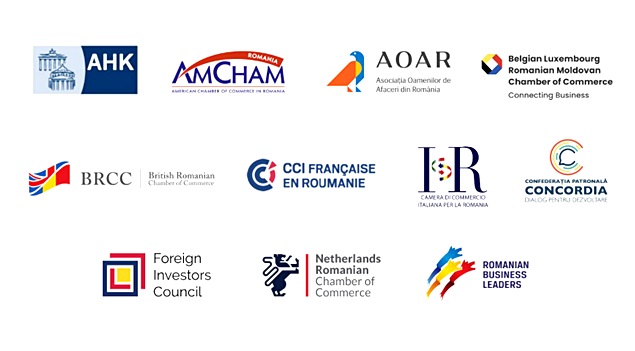1755

Business Community Urges Political Leaders to Adopt Responsible Fiscal Reform Through Dialogue and Transparency
Amid ongoing debates over Romania’s economic recovery and budget deficit correction, business organizations are making a firm appeal to the leaders of parliamentary parties involved in the current consultations.
We are fully aware that the decisions and actions taken during this period will have a deep and lasting impact on the population, businesses, the economy, investor confidence, and Romania’s international standing. This is precisely why we need genuine dialogue, so that the measures adopted address both the correction of imbalances and the protection of the economy’s capacity to perform in the medium and long term.
We call on political parties to also listen to the voice of the business community — the very sector that sustains the economy. We are increasingly concerned that the current debate seems overwhelmingly focused on raising taxes, in the absence of any public vision or political commitment to reducing excessive government spending or modernizing the state apparatus.
Without a real commitment to internal reform, any fiscal measures risk overburdening the economic engine necessary for recovery.
We recognize the serious risks posed by the potential suspension of European funds and a downgrade in Romania’s credit rating — developments that would be devastating to the country’s future. These risks demand a comprehensive and responsible response, through a balanced package of measures that address both spending cuts and revenue increases. Moreover, the future policy package must also include investment and economic activity stimulation measures.
In order to maintain Romania’s key competitive advantages — such as the flat tax — and to avoid deterring investment or hindering long-term development, we strongly believe that any proposed package of reforms must be based on the following principles:
- Preserving the flat tax rate, applied uniformly and fairly, with the elimination of all exemptions — a simple and efficient mechanism for both taxpayers and authorities, essential to supporting economic growth, reducing distortions, and combating tax evasion;
- Cutting non-essential public expenditures, including excessive administrative costs, redundant agencies, and discretionary political spending;
- Implementing substantial reforms in public sector management, prioritizing performance, efficiency, genuine bureaucracy reduction, and transparency;
- Eliminating wasteful budget allocations, such as unjustified allowances and the excessive public financing of electoral campaigns;
- Protecting and prioritizing critical public investments in infrastructure, education, and innovation — key pillars of long-term growth;
- Ensuring tax fairness by eliminating exemptions, repealing turnover taxes, and abolishing the construction-specific tax;
- Improving tax collection efficiency, especially by closing the VAT gap and prioritizing large-scale efforts to combat tax evasion;
- Accelerating digitalization, administrative simplification, and reducing red tape;
- Maximizing EU fund absorption by simplifying procedures and removing bureaucratic bottlenecks.
The state must lead by example. A credible response to this fiscal challenge begins with a clear message that public money will be used more effectively and that the state is ready to reform itself.
Improving tax compliance and voluntary payment — through smart enforcement, digitalization, and tackling systemic tax evasion, as well as increasing transparency and predictability in fiscal policies and public spending — is a vital part of the solution. However, this must not be confused with introducing new taxes or increasing existing ones, or with arbitrarily penalizing compliant taxpayers through the actions of enforcement agencies.
The private sector is already operating under significant pressure caused by unpredictability and administrative burdens. Leaked discussions circulating in the public space, without any proper impact analysis or consultation with the business environment, only add to the current instability and economic gridlock — especially considering the state’s failure to meet its own reimbursement obligations to many honest and responsible private taxpayers.
Solidarity cannot function without reciprocity, nor in a fiscal framework that continuously creates inequities and privileged categories. Honest companies should not have to bear the cost of deficits caused by the irresponsible management of public finances.
Efficient, responsible economic activity and fairly rewarded work must not be discouraged through tax mechanisms that stifle growth.
The Spring 2025 Report of the European Commission highlights the excessive increase in expenditures and Romania’s deviation from its fiscal targets. Ignoring these warnings will only deepen the country’s imbalance. What Romania needs now is not another wave of taxes, but a responsible medium-term fiscal plan anchored in spending reform, institutional efficiency, and economic predictability.
As always, the private sector recognizes the gravity and urgency of the situation — and is prepared to be part of the solution. But this requires transparency and dialogue. The solidarity expected from the private sector must be reflected at all levels of the state — not through the implicit transfer of sacrifice, but through a genuine commitment to reform and fiscal discipline.
We invite political leaders to engage in an authentic dialogue with the business community — a critical step before any policy package is approved. The private sector must be actively involved in the discussions that shape the economic and fiscal agenda of the next Government.
Signatory Organizations:
- AHK Romania – Romanian-German Chamber of Commerce and Industry
- AmCham Romania – American Chamber of Commerce in Romania
- AOAR – Romanian Businessmen's Association
- BEROCC – Belgian Luxembourg Romanian Moldovan Chamber of Commerce
- BRCC – British Romanian Chamber of Commerce
- CCIFER – French Chamber of Commerce and Industry in Romania
- CCIPR – Italian Chamber of Commerce in Romania
- NRCC – Dutch Romanian Chamber of Commerce
- CONCORDIA – Employers’ Confederation
- FIC – Foreign Investors Council
- RBL – Romanian Business Leaders Foundation





